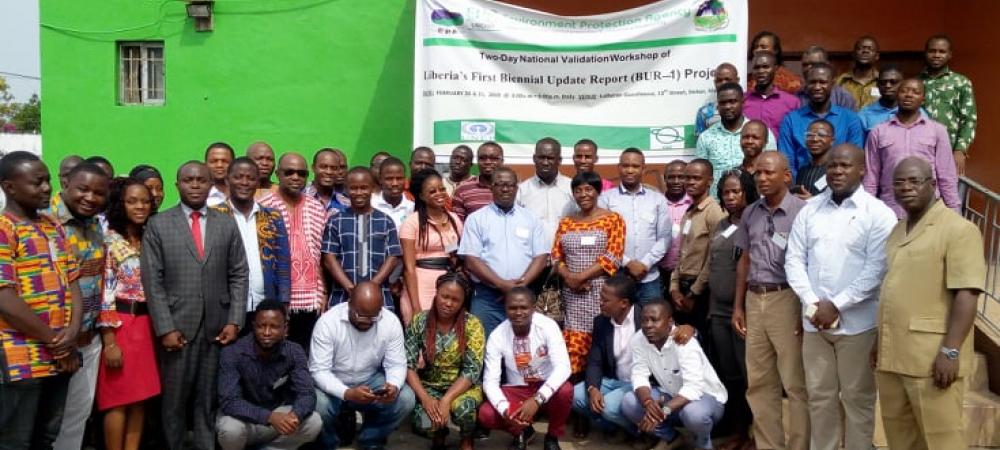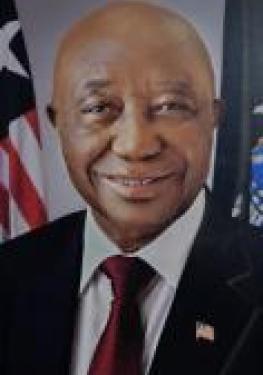
The Environmental Protection Agency of Liberia (EPA) has concluded a two-day national validation workshop on Liberia’s First Biennial Update Report (BUR-1) Project.
BURs are reports to be submitted by non-Annex I Parties, containing updates of national Greenhouse Gas (GHG) inventories, including a national inventory report and information on mitigation actions, needs and support received.
Such reports provide updates on actions undertaken by a party to implement the Convention, including its GHG emissions and removals by sinks, as well as on the actions to reduce emissions and enhance sinks.
The BUR-1 national validation workshop is intended to prepare and submit the country to fulfill its obligations to the United Nations Framework Convention on Climate Change (UNFCCC Article 12).
The workshop ran from February 20-21, 2020.
Participants were drawn from government ministries and agencies, including Ministry of Agriculture, Ministry of Mines & Energy, Liberia Electricity Corporation (LEC), Rural Renewable Energy Agency (RREA), Forestry Development Authority (FDA), City Corporations of Monrovia and Paynesville, National Fisheries and Aquaculture Authority (NaFAA) and Ministry of Transport.
Other participants represented the University of Liberia, United Methodist University (UMU), Cuttington University, CEMENCO, environmental groups and representatives of rural parts of Liberia.
Addressing the opening ceremony on behalf of Mines & Energy Minister Gesler E. Murray, the Assistant Minister for Planning, Research and Development, Mr. Johnson S. Willabo, Jr. said his entity is a part of the project because it is related to the energy sector.
According to Assistant Minister Willabo, the hydro at Mount Coffee in rural Montserrado County is a very efficient way of generating power for which his ministry is highly involved with creating awareness in the usage of energy through power.
However, he said the challenge facing this drive is the reduction of power at the hydro during some times of the year for which he revealed that solar power generation as an option has become inevitable.
He added that the power lines of the CLSG (Cote d’Ivoire, Liberia, Sierra Leone and Guinea) from neighboring Cote d’Ivoire are also major components in the generation of electricity through energy.
Also speaking at the start of the two-day national validation workshop of Liberia’s first BUR-1 Project, a proxy for Dr. Nathaniel T. Blama, Sr., EPA Executive Director, Mr. Z. Elijah Whapoe stated that Liberia as a party to the UNFCCC is under obligation to implement the first BUR-1 Project.
With work being developed in this framework, Mr. Whapoe, who is a Manager for Planning and Policy at EPA, said the report considers constraints and gaps being experienced by the country.
“We are working along with all stakeholders in developing a national State of the Environment Report (EPA),” Mr. Whapoe informed the participants.
In his presentation, Mr. Benjamin S. Karmorh, Jr., National Focal Point for the UNFCCC, pointed out that climate change is a global crisis and Liberia is no exception to it, with analysis and research showing that the country is vulnerable to the adverse impacts of this phenomena.
He added that the impacts of climate change in Liberia is seen all over the country.
Although Liberia has relatively high elevation with highland and rolling hills covered rain forest, he said climate change is a global threat with Liberia being no exception as erosion continues to eat up the coastline.
Mr. Karmorh explained: “It’s in this view that Liberia is a signatory to a number of conventions and protocols in making sure that climate change related issues are addressed at both local and international levels.”
Moreover, Mr. Karmorh informed the gathering that the impact of global climate change will increase and if nothing is done may lead to devastation as this is already being felt in Liberia and human activities adding to this effect is not helping either.
He recommended that the environmental resources and potential of Liberia is enormous and if properly managed will benefit the current generation and future generations to come.
“Liberia is vulnerable to climate change due to high rate of poverty, poor infrastructures, inadequate and lack of trained human resources, etc. It is a serious and on-going threat to our Agenda for Transformation. It is also a threat to national sustainable development, peace, security and stability,” Mr. Karmorh said during his presentation.
For his part, Dr. Charles Asumana, Sr., National Project Coordinator of the BUR–1 Project & UNFCCC Technical Expert Reviewer, said the objective of the project is to prepare and submit Liberia’s First BUR–1 to fulfill national obligations to the UNFCCC (Article 12).
Dr. Ansumana disclosed that the project proposal has been prepared as per requirements of the UNFCCC for BURs and based on Decision 17/CP. 8 - Guidelines for the preparation of Biennial Update Report from Parties not included in Annex I to the Convention.
He said the project falls under the support of the Global Environmental Facility (GEF) for convention-related reporting and assessment, and is implemented on an agreed full cost basis requiring only in-kind contribution by GEF-eligible countries.
He went on to say that the project is in conformity with objective 3 of the GEF-6 Climate Mitigation Strategy that focuses on fostering enabling conditions to mainstream mitigation concerns into sustainable development strategies.
Liberia’s strategic location in the West Coast of Africa within the Mano River basin makes it ideal for her rich natural resources in the region, likewise some major environmental issues associated with it.
The inter-linkages between environment, development, security and good governance in Liberia are clear and the threat of climate change is ever present.
Over the last few decades, poor environmental management, overexploitation of natural resources and poverty have been some of the issues that the country has been faced with but due to the brilliant leadership of many stakeholders involved mainly the EPA and the intervention of international partners, Liberia seems to be well on course.
The EPA is with the conviction that the impact of global climate will increase and if nothing is done may lead to devastation.
Liberia has vast coastline which stretches about 580 kilometers and host huge population density of the country.
The placement of major sea ports along the coastline and the ever presence of beautiful beaches give a greater advantage to the Liberian economy.
The biodiversity supports lives and livelihoods, by providing essential services. It is a major source of harvestable goods including food, medicines and building materials.
Biodiversity is also essential for the regulation of natural processes, and the earth’s life support systems such as carbon sequestration, soil formation and water purification.
Climate change is a global crisis and Liberia is no exception to it, analysis and research show that Liberia is vulnerable to the adverse impacts of this phenomena. The impacts of climate change in Liberia is seen all over the country.
It’s in this view that Liberia is signatory to a number of conventions and protocols in making sure that climate change related issues are addressed at both local and international levels.



